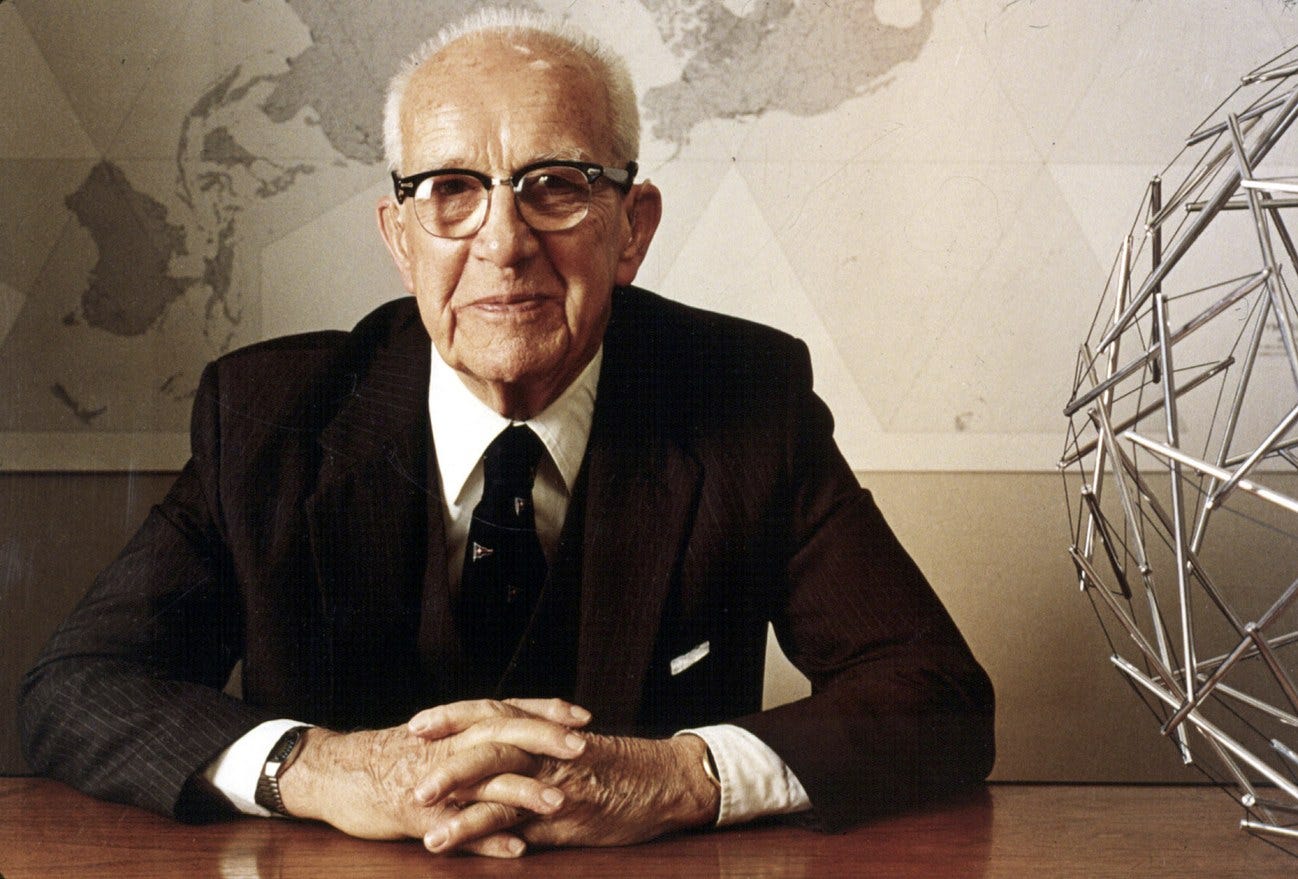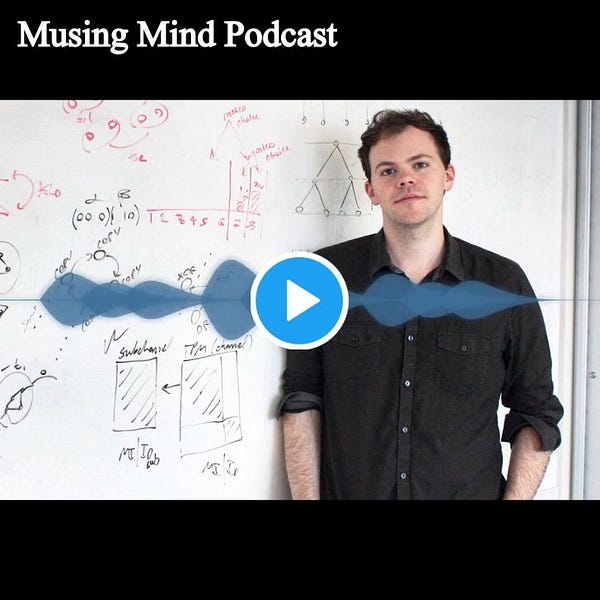Mind Matters
Anarchy, Emergence, & Comprehensive Design
Hello fellow occupants of spaceship earth,
Let’s just get into it.
Buckminster Fuller: The Revolution is for Comprehensive Designers

I’m new to Buckminster Fuller, but he seems like one of those ebullient polymaths with vitality surging through his veins, splashing all over anyone who reads him.
I love this sentiment from his New Yorker profile, that the coming revolution will emerge from comprehensive designers:

And here’s Buckminster prefiguring David Graeber’s Bullshit Jobs, expressing the idea I seriously jive with that if we’re making any ‘progress’ as a species, it must liberate us from the idea, and lived reality, that we have to ‘earn’ a living.
Humans may not have a ‘right’ to live, a ‘right’ to healthcare or anything like that. But if we have the potential, if it’s possible for us to weave these things into the fabric of cultural givens, as boons of progress, isn’t that one of the greatest leaps forward we could make?
“We must do away with the absolutely specious notion that everybody has to earn a living. It is a fact today that one in ten thousand of us can make a technological breakthrough capable of supporting all the rest. The youth of today are absolutely right in recognizing this nonsense of earning a living. We keep inventing jobs because of this false idea that everybody has to be employed at some kind of drudgery because, according to Malthusian-Darwinian theory, he must justify his right to exist. So we have inspectors of inspectors and people making instruments for inspectors to inspect inspectors. The true business of people should be to go back to school and think about whatever it was they were thinking about before somebody came along and told them they had to earn a living.”
And a final Buckminster quote:
“Nature is trying very hard to make us succeed, but nature does not depend on us. We are not the only experiment.”
Anarchy in the 21st Century
In trying to make sense of post-capitalism, I’ve arrived at the threshold of anarchism. Specifically, something that Murray Bookchin calls Post-Scarcity Anarchism.
Anarchism is the only organized approach to living I’ve found that seriously explores life beyond private property. And increasingly, dissolving the ideology of private property in favor of some system of collectively organized resources - available for use without requiring ownership - seems like a promising, concrete way to transcend the limitations of capitalist forms of life.
[What are these shortcomings? I think they have to do with the Buckminster Fuller quote below - that capitalism will never evolve us past what I believe is the antiquated fact that everyone must spend their lives ‘earning’ a living. In the 21st century, I think we can leverage our progress and design an earned living as part of our cultural inheritance, liberating us to tango with more complex matters].
Post-scarcity anarchism isn’t about the intellectual history of anarchist thinkers, it asks what’s possible in this new era of cultural possibility that was unimaginable to anyone writing pre-2000. It’s future-facing, as Bookchin begs us to be:
“When will we begin to learn from what is being born instead of what is dying?”
More specifically, post-scarcity anarchism argue that:
“A century ago, scarcity had to be endured; today, it has to be enforced”
Anarchism suggests that in the 21st century, scarcity is artificially imposed not by some group of nefarious white men in secret board rooms, but private ownership. Capitalism as it stands has scarcity baked into its governing logic by the underlying ideology of private property.

Capitalism is predicated upon Darwinian competition rather than Kropotkin’s cooperation (Kropotkin is a seminal anarchist writer who convincingly challenged Darwin’s notion that competition drove survival, suggesting cooperation played a more central role).
Anarchism suggests that private property keeps us rooted in competitive, rivalrous dynamics amidst the possibility for cooperative, mutually beneficial dynamics. By provoking rivalrous dynamics and failing to appease survival insecurity, this variety of capitalism reaches all the way down our brainstems. It aggravates our amygdalas, our cortico-adrenal systems where the fear-based ‘fight or flight’ response takes over our decision making processes, eclipsing the pre-frontal cortex where higher-order thinking lives. Scarcity capitalism keeps our mentalities rooted in its primitive capacities.
So much of the anarchist, even democratic socialist sentiment that’s surging back into fashion comes from this desire to democratize liberation from the anxieties and mentalities of survival insecurity.
For example, here’s Noam Chomsky paraphrasing Marx:
“…somewhere or other he said: socialism is an effort to try to solve man’s animal problems, and after having solved the animal problems, then we can face the human problems—but it’s not a part of socialism to solve the human problems; socialism is an effort to get you to the point where you can face the human problems.”
Anarchism believes there’s a more holistic form of freedom available to us than the hollow shells of individual liberty pedaled by neoliberalism. It believes that private property - and, of course, governing power structures - are the dams holding us back, and doing away with them will release us into more fully human dynamics.
I’m still new to anarchism, trying to get a feel for what it might add to our discourse today. Here’s my reading list so far - if you have any suggestions or feedback, let me know (you can respond directly to this email):
Bookchin’s Post-Scarcity Anarchism
Noam Chomsky’s On Anarchism
David Graeber’s Fragments of an Anarchist Anthropology
The originals - Proudhon, Bakunin, & Kropotkin
Hugh Small’s The Future of Anarchism
Emergence is Emerging
Seems like emergence is having a bit of a cultural moment these past few years. And now Tim Urban is writing a monster essay series for which emergence seems central to the whole thing.
Kurzgesagt’s emergence explainer video remains a fantastic introduction (their videos are ridiculously good):
Emergence is part of the story of networks. If you see the universe as one big network, composed of smaller nested networks, emergence is what happens as these networks evolve.
Networks want to sustainably emerge new forms of complexity. From this view, humans are a pretty interesting experiment as far as complexity goes. For us to align with the networked project of emergence, we’d do well to design for a few basic principles of emergence: diversity & differing, meta-stability, distributed organization, and feedback loops between us and our environments.
My essay on a post-capitalist philosophy of networks is a deeper look into all that.
Body Language & Sentence Structure
Reading Keith Johnstone’s book, Impro: Improvisation and the Theatre, because I’ve been told it’s one of the best books on play (in the broadest sense). It seems like one of those works written by someone so masterful in his field that his insights go all the way down, and apply to everything. Theatre is just his entryway into the sub-currents that run through everything.
This bit is fascinating. While doing ‘status work’ with his students, playing with body positioning to communicate various social status’ and personas, Keith found that even the slightest tweaks to body language unconsciously alter everything from eye contact to sentence structure.
He found that when inhabiting high-status body language, students unknowingly spoke in more complete sentences. Low-status body language led to incomplete grammar and hesitation, and this all occurred without students being aware of the changes:
“If I speak with a still head, then I’ll do many other high-status things quite automatically. I’ll speak in complete sentences, I’ll hold eye contact. I’ll move more smoothly, and occupy more ‘space’. If I talk with my toes pointing inwards I’m more likely to give a hesitant little ‘er’ before each sentence, and I’ll smile with my teeth covering my bottom lip, and I’ll sound a little breathless, and so on. We were amazed to find that apparently unrelated things could so strongly influence each other; it didn’t seem reasonable that the position of the feet could influence sentence structure and eye contact, but it is so.”
The position of the feet influence sentence structure! So watch your toes.
Simulacra & Self-Simulation
This essay from Steve Monacelli in the new Protean Magazine is phenomenal.
As society increasingly ‘goes digital’, and data collection reaches deeper into our being, the digital representations of our selves constructed (and predicted) by algorithms are becoming so rich, so detailed, and so real, that they threaten to evolve from shadows we cast in the digital space, to the first, ‘real’ self of which we are the secondary shadow:
“When our bodies in physical space are superseded by digital representation, our physical movements are no longer our own…If it has not already, a dialectical turn may soon occur: our once-digital shadows, become simulacra, may begin to cast us.”
As our digitally reconstructed selves capture more nuance of our psychology, they not only better predict our behavior, but can be used to manipulate it. We may wind up simply acting out the will of our predictive digital selves, being marketed and sold everything our digital simulacra tells companies we want.
This is frightful on a number of fronts. Algorithms feed our basest desires. Status, dopamine, and what comes easy. In a world where we’re sold everything we want, we’re drained of the discipline and gusto to pursue more larger goals:

Scientists Discover Neural Mechanisms for Mortality-Denial
A recent study suggests they’ve discovered the neural mechanisms that actively suppress awareness of our own mortality.
Participants were shown a rapid series of related images, with one deviant image tucked in the sequence.
When the deviant image was death related and implicating their own selves, the brains predictive response was eliminated. It ‘ignored’ the deviant image at a subconscious level. When the deviant image was not related to their own death, however, participants’ predictive response functioned just fine.
Here’s the abstract:

Musing Mind Podcast
I shared a few snippets from my first 3 podcast episodes on Twitter recently. Here’s Erik Hoel talking about extrinsic drift and our neglect of consciousness:


Podcast will be coming out shortly. I’m polishing up a few loose ends, and working with a friend, incredible designer, and Mind Matters subscriber(!) Callum Flack to create the cover art, and then we’ll be off & running.
That’s all.
As always, feel free to reach out for any reason, or check out the full website: www.MusingMind.org.
If you find any value here, feel free to support me by sharing the website or newsletter link - musingmind.substack.com - with friends. Or hit this button to subscribe:
Cheers,
Oshan